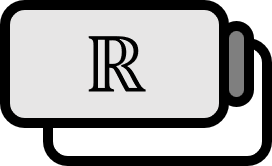Uniform Convergence and Differentiation
Theorem1
$$ f^{\prime} (x) = \lim_{n \to \infty} f_{n}^{\prime} (x) \quad a \le x \le b $$
Explanation2
The result of the theorem can be summarized as “the limit of the derivatives is equal to the derivative of the limits”. In other words, it is possible to interchange the limit symbol and the differentiation symbol.
$$ \dfrac{d}{dx} \lim\limits_{n \to \infty} f_{n} (x) = \lim\limits_{n \to \infty} \dfrac{d}{dx} f_{n} (x) \quad a \le x \le b $$
The reason for considering uniform convergence of a sequence of functions concerning differentiation is, firstly, the pointwise convergence does not preserve the differentiability (Counterexample 1). Secondly, even if $f_{n} \to f$ holds and $f$ is differentiable, $f_{n}^{\prime} \to f^{\prime}$ might not hold (Counterexample 2).
Counterexample 1
Pointwise convergence of a sequence of differentiable functions $f_{n}$ to $f$ does not guarantee that $f$ is differentiable.
Proof
Function $f_{n}(x) = x^{n}$ is differentiable in $[0, 1]$. Define function $f$ as follows.
$$ f (x) = \begin{cases} 0 & \text{if } 0 \le x \lt 1 \\ 1 & \text{if } x = 1 \end{cases} $$
Then, $f_{n}(x)$ converges pointwise to $f(x)$ at every point $x \in [0, 1]$. However, it is clear that $f$ is not differentiable at $x = 1$.
■
Counterexample 2
In the interval $[0, 1]$, $f_{n} \to f$, but there exist differentiable functions $f_{n}$ and $f$ such that
$$ \lim\limits_{n \to \infty} f_{n}^{\prime} (x) \ne \left( \lim\limits_{n \to \infty} f_{n}(x) \right)^{\prime} \quad \text{ for } x=1 $$
Proof
Assume $f_{n}(x) = \dfrac{x^{n}}{n}$ and $f(x) = 0$. Then, in the interval $[0, 1]$,
$$ x^{n} \to 0 \text{ and } n \to \infty \quad \text{ as } n \to \infty $$
Thus, $f_{n} \to f$ holds. However, since $f_{n}^{\prime} (x) = x^{n-1}$, it follows that $f_{n}^{\prime} (1) = 1$. Therefore,
$$ 1 = \lim\limits_{n \to \infty} f_{n}^{\prime} (1) \ne \left( \lim\limits_{n \to \infty} f_{n}(1) \right)^{\prime} = 0 $$
■
Proof
Assumption: $f_{n}(x_{0}) \to f(x_{0})$ and $f^{\prime}_{n}$ uniformly converge.
Let a small positive number $\epsilon \gt 0$ be given. By the equivalence of convergent sequences and Cauchy sequences, there exists a positive number $N$ such that the following holds due to the assumption.
$$ n, m \ge N \implies \begin{array}{l} |f_{n} (x_{0}) - f_{m} (x_{0})| \lt \dfrac{\epsilon}{2} \qquad\qquad\qquad\qquad\quad\ \ (1) \\[0.5em] \text{and} \\[0.5em] |f_{n}^{\prime} (t) - f_{m}^{\prime} (t)| \lt \dfrac{\epsilon}{2(b - a)} \quad (a \le t \le b) \qquad (2) \end{array} $$
Applying the mean value theorem to function $f_{n} - f_{m}$ along with $(2)$, we obtain the following. Given $n ,m \ge N$ and $x, t \in [a, b]$,
$$ \begin{aligned} \left| \left( f_{n}(x) - f_{m}(x) \right) - \left( f_{n}(t) - f_{m}(t) \right) \right| &= |x - t| \left| f_{n}^{\prime} (s) - f_{m}^{\prime} (s) \right| \quad (t \le s \le x) \nonumber \\ &\lt |x - t|\dfrac{\epsilon}{2(b - a)} = \dfrac{\epsilon}{2} \dfrac{|x - t|}{(b - a)} \nonumber \\ &\lt \dfrac{\epsilon}{2} \end{aligned} \tag{3} $$
From $(1)$ and $(3)$, the following inequality holds. Given $n, m \ge N$ and $x \in [a, b]$,
$$ \begin{align*} \left| f_{n}(x) - f_{m}(x) \right| &= \left| f_{n}(x) - f_{m}(x) + \big[f_{n}(x_{0}) - f_{n}(x_{0})\big] + \big[f_{m}(x_{0}) - f_{m}(x_{0}) \big] \right| \\ &\lt \left| f_{n}(x) - f_{m}(x) - (f_{n}(x_{0}) - f_{m}(x_{0})) \right| + \left| f_{n}(x_{0}) - f_{m}(x_{0}) \right|\\ &\lt \dfrac{\epsilon}{2} + \dfrac{\epsilon}{2} = \epsilon \end{align*} $$
The choice of $N$ is independent of $x$, so $f_{n}$ uniformly converges in the interval $[0, 1]$. Let the limits be $f(x) = \lim\limits_{n \to \infty} f_{n}(x)$ and $(a \le x \le b)$.
Now, fixing $x \in [a, b]$, define functions $\phi_{n}$ and $\phi$ as follows.
$$ \phi_{n}(t) = \dfrac{f_{n}(t) - f_{n}(x)}{t - x},\qquad \phi(t) = \dfrac{f(t) - f(x)}{t - x} \quad (x \ne t \in [a,b]) $$
Then, the following holds.
$$ \lim\limits_{t \to x} \phi_{n}(t) = \lim\limits_{t \to x} \dfrac{f_{n}(t) - f_{n}(x)}{t - x} = f_{n}^{\prime} (x) $$
Also, from the first inequality in $(3)$, we obtain the following.
$$ \left| \phi_{n}(t) - \phi_{m}(t) \right| \lt \dfrac{\epsilon}{2(b - a)} \qquad (n, m \ge N) $$
Therefore, $\phi_{n}$ uniformly converges to $t \ne x$. Thus, since $f_{n} \to f$,
$$ \phi_{n}(t) \rightrightarrows \phi(t) \quad \text{ or } \quad \lim\limits_{n \to \infty} \phi_{n}(t) = \phi (t) \quad (a \le t \le b, t \ne x) $$
Uniform convergence and continuity
If $f_{n} ⇉ f$ on a metric space $E$, then the following holds for accumulation points $x$ in $E$.
$$ \lim\limits_{t \to x}\lim\limits_{n \to \infty} f_{n}(t) = \lim\limits_{n \to \infty}\lim\limits_{t \to x} f_{n}(t) $$
Since $\phi_{n} ⇉ \phi \text{ on } [a,b]\setminus \left\{ x \right\}$, applying the above theorem to $\phi_{n}$, the following holds.
$$ \begin{align*} && \lim\limits_{t \to x}\lim\limits_{n \to \infty} \phi_{n}(t) &= \lim\limits_{n \to \infty}\lim\limits_{t \to x} \phi_{n}(t) \\ \implies && \lim\limits_{t \to x} \phi(t) &= \lim\limits_{n \to \infty} f^{\prime}_{n}(x) \\ \implies && \lim\limits_{t \to x} \dfrac{f(t) - f(x)}{t - x} &= \lim\limits_{n \to \infty} f^{\prime}_{n}(x) \\ \implies && f^{\prime}(x) &= \lim\limits_{n \to \infty} f^{\prime}_{n}(x) \end{align*} $$
■
Walter Rudin, Principles of Mathmatical Analysis (3rd Edition, 1976), p152-153 Sequence of functions $\left\{ f_{n} : f_{n} \text{ is differentiable on } [a, b] \right\}$ that are differentiable on the interval $[a, b]$ converges pointwise at point $x_{0} \in [a, b]$. If $\left\{ f_{n}^{\prime} \right\}$ uniformly converges in interval $[a, b]$, then $\left\{ f_{n} \right\}$ also uniformly converges to a function $f$ which is differentiable in the interval $[a, b]$, and the following holds. ↩︎
William R. Wade, An Introduction to Analysis (4th Edition, 2010), p222-223 ↩︎
